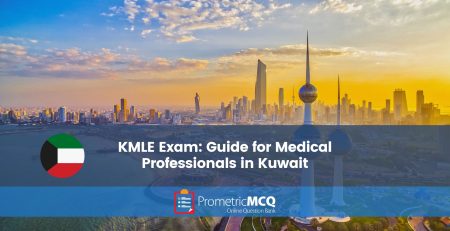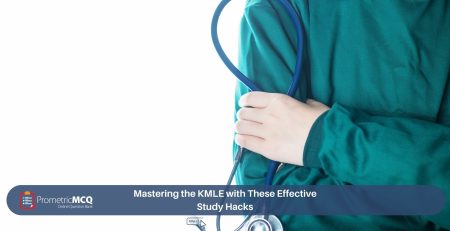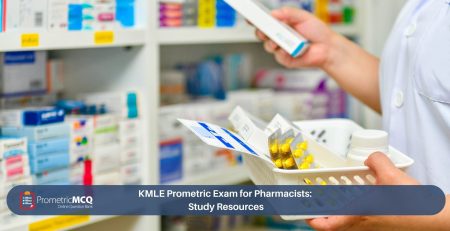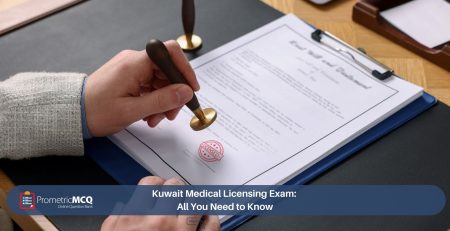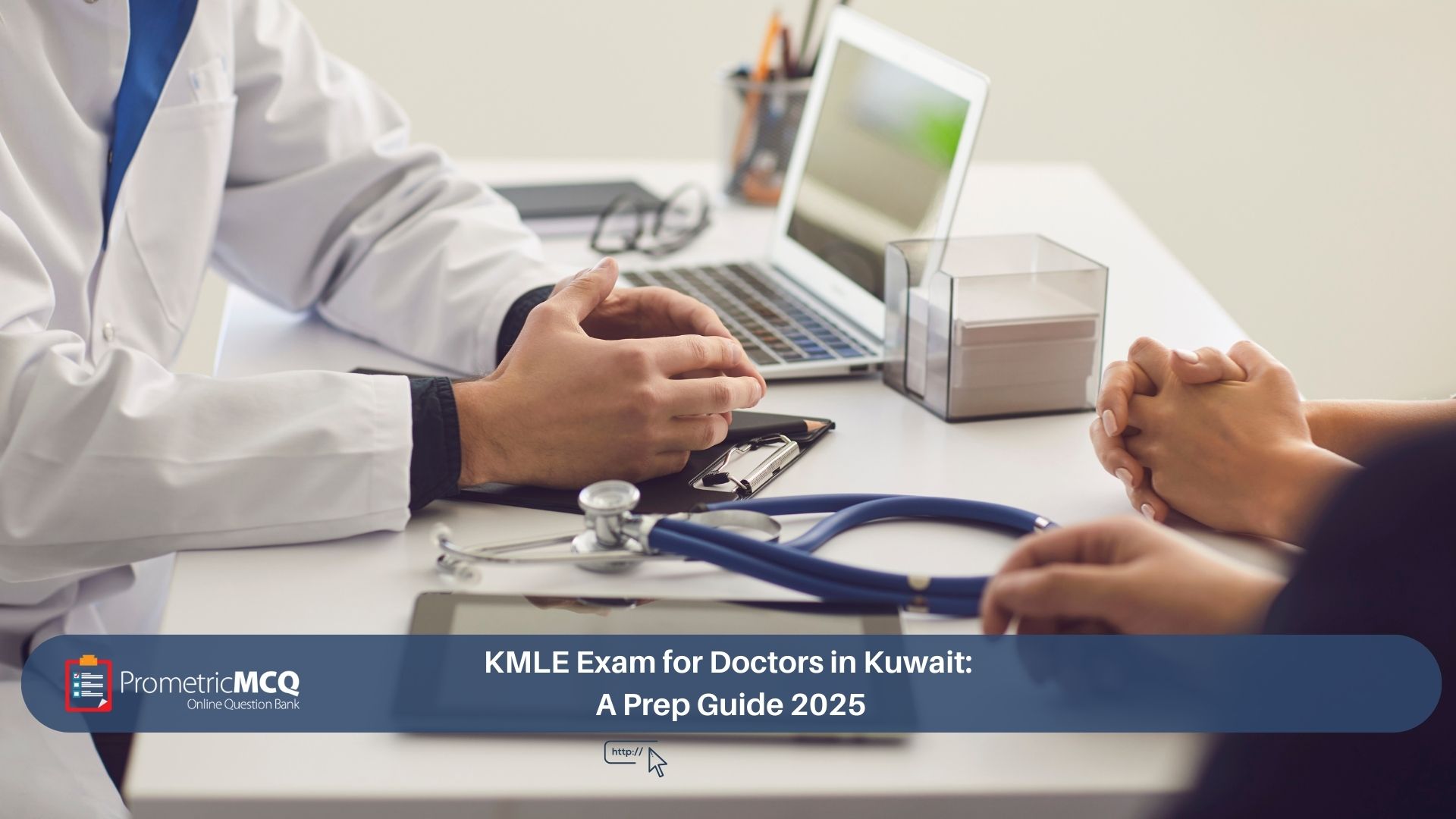
KMLE Exam for Doctors in Kuwait: A Prep Guide 2025
fatima@prometricmcq.com2025-09-19T02:12:18+00:00Table of Contents
ToggleKMLE Exam for Doctors in Kuwait: A Prep Guide 2025
Kuwait’s healthcare system, renowned for its high standards and significant government investment, stands as a highly attractive destination for medical professionals globally. To ensure that these standards are consistently met and exceeded, the Ministry of Health (MOH) of Kuwait requires all physicians to pass the Kuwait Medical Licensing Exam (KMLE). This exam is the critical gateway for doctors seeking to practice in the country, serving as a robust validation of their clinical knowledge, skills, and readiness to provide exceptional patient care.
The KMLE is far more than a test of theoretical knowledge. It is a comprehensive, clinically oriented assessment designed to evaluate a doctor’s ability to diagnose, manage, and treat a wide spectrum of medical conditions encountered in general practice. Success on this exam is not achieved through rote memorization but through a deep understanding of clinical principles, evidence-based guidelines, and the application of this knowledge to real-world patient scenarios.
This ultimate 2025 preparation guide is engineered to be your definitive roadmap to conquering the KMLE. We will provide a meticulous breakdown of the exam’s structure, a deep dive into the high-yield syllabus topics, a proven 10-week study strategy, and a comprehensive 10-point FAQ to address every aspect of your preparation journey. Our goal is to replace uncertainty with a strategic, confident approach, equipping you to pass the KMLE on your first attempt and launch your medical career in Kuwait.
Key Takeaways for KMLE Success
- Broad Clinical Scope: The KMLE for General Practitioners is a comprehensive exam covering all major medical disciplines, with a strong emphasis on Internal Medicine, Pediatrics, Surgery, and OB/GYN.
- Clinical Vignettes are Standard: The vast majority of questions are presented as patient case studies, requiring strong diagnostic and management skills.
- Evidence-Based Medicine is Key: Answers should be based on current, internationally accepted clinical guidelines, not outdated or anecdotal practices.
- Structured Preparation is Crucial: A disciplined 10-12 week study plan focusing on high-yield topics and extensive MCQ practice is the proven formula for success.
- No Negative Marking: You must answer every question. A well-reasoned guess is always better than a blank response.
Deconstructing the 2025 KMLE Blueprint
A successful campaign begins with knowing the terrain. Understanding the KMLE’s structure is the first step in building an effective study plan. This exam is a cornerstone of the Kuwait Prometric exam questions (KMLE) landscape.
Core Exam Characteristics:
- Administrator: The exam is conducted under the authority of the Kuwait Ministry of Health, typically administered by Prometric.
- Format: It is a Computer-Based Test (CBT) consisting entirely of Multiple-Choice Questions (MCQs).
- Structure: The exam for General Practitioners is usually divided into two sections, each containing 100 MCQs.
- Total Questions: 200 MCQs.
- Duration: 3 hours (180 minutes) per section, for a total of 6 hours of testing time, with a scheduled break in between.
- Passing Score: The official result is a Pass/Fail. The required passing score is officially set at 60%. To ensure success, you should aim for a consistent score of 70% or higher in your practice tests.
Deep Dive: High-Yield Syllabus for the KMLE General Practitioner Exam
The KMLE for GPs is designed to ensure a broad competency across all essential fields of medicine. A well-balanced study plan must allocate sufficient time to each of these high-yield domains.
| Medical Discipline | Key Topics and High-Yield Concepts for 2025 |
|---|---|
| Internal Medicine (Approx. 35-40%) | This is the largest and most critical section. Focus on Cardiology (IHD, heart failure, hypertension), Endocrinology (Diabetes Mellitus, thyroid disorders), Pulmonology (Asthma, COPD, pneumonia), Gastroenterology (PUD, IBD, liver diseases), Nephrology (AKI, CKD), and common rheumatological and infectious diseases. |
| General Surgery (Approx. 15-20%) | Emphasis on the acute abdomen (appendicitis, cholecystitis, pancreatitis, bowel obstruction), trauma management (ATLS principles), common surgical procedures, pre-operative and post-operative care, and basics of surgical oncology and wound healing. |
| Pediatrics (Approx. 15-20%) | Key topics include developmental milestones, immunization schedules, common pediatric infections (e.g., bronchiolitis, gastroenteritis), management of dehydration, asthma, and congenital anomalies. Basic neonatal resuscitation and Apgar scoring are also important. |
| Obstetrics & Gynecology (Approx. 10-15%) | Focus on routine antenatal care, management of common pregnancy complications (gestational diabetes, pre-eclampsia), labor and delivery, postpartum care (especially hemorrhage), and common gynecological issues like abnormal uterine bleeding, PCOS, and STIs. Reviewing a dedicated Obstetrics & Gynecology MCQ bank is highly recommended. |
| Family Medicine & Public Health (Approx. 5-10%) | This domain covers principles of primary care, preventive medicine (screening guidelines), management of chronic diseases in a community setting, basic biostatistics, and understanding of epidemiological concepts. |
| Basic Sciences & Ethics (Approx. 5%) | Clinically relevant anatomy, physiology, and pharmacology. Questions on medical ethics, professionalism, and patient confidentiality are also included. |
For every clinical vignette you read, force yourself to generate a differential diagnosis *before* you look at the answer choices. This trains your clinical reasoning muscles and prevents you from being swayed by clever distractors.
The Ultimate 10-Week KMLE Study Strategy
This schedule is designed for disciplined, focused preparation to ensure you peak at the right time for your exam.
Phase 1: Comprehensive Subject Review (Weeks 1-5)
This phase is about rebuilding your core knowledge base, one subject at a time.
- Weeks 1-2: Internal Medicine. This is the largest section, so give it the most time. Cover 2-3 systems per week (e.g., Cardio/Pulm/Endo in week 1, GI/Nephro/Rheum in week 2).
- Week 3: General Surgery & Pediatrics. Dedicate half the week to each subject, focusing on the high-yield topics listed above.
- Week 4: OB/GYN & Family Medicine. Again, split the week between these two crucial areas.
- Week 5: Rapid Review & Weak Areas. Use this week to quickly review all subjects and dedicate extra time to the topics you found most challenging in the first four weeks.
- Daily Task: 3-4 hours of focused content review using a trusted resource (e.g., a high-yield review book like Master the Boards USMLE Step 2 CK). Each day, complete 50 untimed MCQs on that day’s topic to consolidate your learning.
Phase 2: Intensive MCQ Gauntlet (Weeks 6-9)
This is where the real learning happens. You must transition from passive reading to active, timed problem-solving.
- Your Primary Tool: A high-quality, timed question bank (QBank) is essential. The goal is to complete at least 2,000-3,000 questions during this phase. A dedicated resource like the KMLE Kuwait Prometric General Practitioner QBank is ideal.
- Methodology: Complete blocks of 40-50 questions in timed mode. Spend twice as much time reviewing the rationales as you did answering the questions. Understand why the correct answer is right and, more importantly, why the other options are wrong. Create flashcards for concepts you repeatedly miss.
- Daily Task: 3-4 hours dedicated solely to solving and reviewing timed MCQ blocks.
Phase 3: Full-Scale Simulation (Week 10)
This final week is about building the mental stamina and confidence needed for a 6-hour exam.
- Day 1 & 4: Take a full-length, 200-question mock exam under strict, timed conditions with a scheduled break.
- Day 2 & 5: Meticulously review your mock exam performance. Analyze your timing, your weaknesses, and any careless errors.
- Day 3 & 6: Light review of your own notes, flashcards, and “must-know” topics like key drug side effects, diagnostic criteria, and immunization schedules.
- Day 7: Rest. Your brain needs to rest and consolidate. Do not study. Organize your documents for exam day and get a good night’s sleep.
Frequently Asked Questions (FAQs) on the KMLE Exam
Eligibility typically requires a recognized medical degree (MBBS, MD, or equivalent) from a university listed in the World Directory of Medical Schools, completion of a one-year internship, and a minimum of 2-3 years of post-internship clinical experience. You must also have a valid medical license and a Certificate of Good Standing from your home country.
Primary Source Verification (PSV) by the DataFlow Group is a mandatory background check where the agency directly contacts your university, previous employers, and licensing body to verify the authenticity of your submitted documents. A positive DataFlow report is required before your license can be issued.
The KMLE is a licensing exam, not a ranking exam. Its primary goal is to ensure a minimum standard of competence for safe practice in Kuwait. While the clinical content is similar to exams like USMLE Step 2 CK or PLAB Part 1, the KMLE is focused on the knowledge expected of a competent General Practitioner and is less concerned with obscure or purely academic topics.
Exemptions are generally only considered for highly qualified senior consultants who hold specific, recognized Western board certifications (e.g., American Board, CCT from the UK, Royal College of Canada). This is not automatic and is reviewed by the Kuwait MOH on a case-by-case basis.
The KMLE is based on international evidence-based medicine. An excellent, free, and highly respected external resource for clinical guidelines is the National Institute for Health and Care Excellence (NICE) from the UK. Their comprehensive guidelines on the diagnosis and management of various conditions are a gold standard globally.
Typically, candidates are allowed three attempts to pass the KMLE. After a third failure, you may be required to undergo a period of clinical attachment or further training before being deemed eligible to re-apply. It is crucial to aim for success on your first attempt.
No, you can complete the initial application and pass the KMLE independently. A passing result makes you eligible for licensure, which is a powerful asset when applying for jobs. A job offer from a licensed clinic or hospital in Kuwait is required for the final license issuance step.
The KMLE exam is conducted entirely in English. While knowing Arabic is a significant advantage for practicing medicine and communicating with patients in Kuwait, it is not a prerequisite for passing the exam. However, learning basic medical Arabic is highly encouraged.
The only document you typically need is your original, valid passport. The name on your passport must exactly match the name you used to register for the exam. No other forms of ID are usually accepted. Arrive at least 30 minutes early.
If you have 10 minutes left and 20 questions remaining, do not panic. Quickly read the last line (the actual question) of each remaining vignette. If you can answer based on that alone, do so. If not, make your best-educated guess and move on. Since there is no negative marking, it is critical to answer every single question.
Conclusion: Your Strategic Path to Practicing in Kuwait
The Kuwait Medical Licensing Exam is a rigorous and comprehensive assessment designed to uphold the highest standards of medical practice. It is a challenging but entirely surmountable hurdle for the well-prepared physician. Success is not a matter of chance but the direct outcome of a strategic, disciplined, and focused preparation plan. By understanding the exam blueprint, mastering the high-yield clinical content through relentless MCQ practice, and executing a sound test-day strategy, you are building a robust foundation for success. This guide provides the framework; your dedication will determine the result. Embrace the challenge, and you will be well on your way to a rewarding medical career in Kuwait.
Ready to Transform Your Preparation into a Passing Score?
Our premium QBank for the Kuwait Prometric GP Exam is specifically designed to mirror the real test, with thousands of high-yield clinical vignettes, detailed rationales, and full-length mock exams to ensure you are fully prepared.





